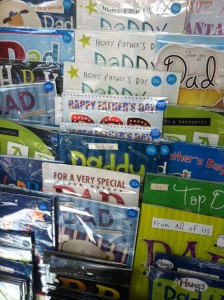It’s Father’s Day this weekend. It may be a manufactured holiday but I celebrate it anyway, so I’m in a shop trying to find a card for my dad in the three minutes before the toddler starts wanting to get out the buggy and start destroying things.* I scan the shelves, sigh, and give up.
In all the years that I’ve been buying Father’s Day cards for my father, I don’t think I have ever bought one from the Father’s Day section. My father is not into football, beer, fast cars or jokes about bodily functions, so that cuts out 90% of the options. And if I bought him a card with a message – or worse, a poem – about what a great father he is, that would feel weird. Not because he isn’t a great father, but because it doesn’t need saying. Or at least it doesn’t need saying in rhyme.
It’s odd really. In some ways – perhaps as a response to the waning of the industry – there’s now more choice in cards than ever. You can buy serious cards, funny cards, sentimental cards, cards with badges, 3D cards, addressed to Dad, Daddy, Father, Stepdad, Grandad or Great-Grandad. But in other ways, the choice is tellingly limited. Colours, for example. If you can find me a Father’s Day card that’s pink, I’ll buy you a pint of raspberry beer. And if you can find one that references opera or painting, which are my dad’s two major interests, I’ll buy you an entire yard of it, if raspberry beer comes in yards, which I doubt. A card that features musicals or Dickens novels would be even better, since those are interests we have in common. I’ll be over here, holding my breath.
So what do Father’s Day cards tell us about the current perception of masculine parenting, as filtered through the imagination of the card industry? Well, there’s not much about the parenting part. What fathers do, in this version of fatherhood, is play sports with their sons, address their daughters as ‘princess’, and earn the money. It’s a depressing vision. And what are children’s images of their dads? Apparently they’re unshaven, overweight lumps in string vests and boxer shorts. Nothing wrong with being any of those things, but again, it’s a bit limiting. Is the assumption that Father’s Day cards only appeal to an extremely specific and stereotypical working-class market? Why?
And yes, this is a feminist issue, of course it is. The perception of fathers and the perception of mothers are all tied in together, and so are the wider perceptions of What Men Are Like and What Women Are Like. Fix one and you start to fix the other**. In the meantime, I’ve bought my dad a card from the general section, with a picture of a giant rubber duck sailing up the Thames. At least it’s interesting.
*I am unfairly maligning her here, by the way. I let her wander around Boots the other day and she began tidying up the shelves. I should start charging shops to let her in.
**I could also write an entire post about how many of my daughter’s birthday cards I buy from the boys’ section. Because while she likes princesses and fairies, she especially likes football and computer games and Dr Who. This should not be weird to anyone.








